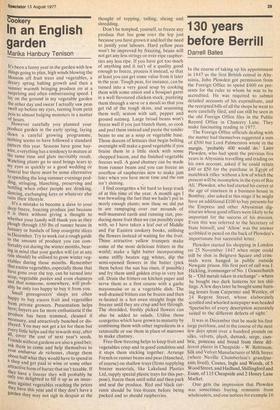Cookery
In an English garden
Marika Hanbury Tenison
It's been a funny year in the garden with few things going to plan, high winds blowing the blossom off fruit trees and vegetables, a dreary spring halting growth and then a sunnier warmth bringing produce on at a surprising and often embarrassing speed. I lay on the ground in my vegetable garden the other day and swear I actually saw peas swell up before my eyes, turning from petit pois to almost bulging monsters in a matter of hours. However carefully you planned your Produce garden in the early spring, laying down a careful growing programme, nothing seems to have followed a standard Pattern this year. Seasons have gone haywire, everything has a tendency to mature at the same time and gluts inevitably result. Watching plants go to seed brings tears to my eyes as quickly as a good wedding or funeral but there must be some alternative to spending the long summer evenings podding, stringing, blanching, preserving and bottling when other people are drinking, dancing, exchanging keys or whatever else stilts their lifestyle. It's a mistake to become a slave to your deep freeze, freezing produce just because it is there without giving a thought to Whether your family will thank you as they Plough through 150 lbs of runner beans in January or bushels of limp courgette slices in December. Try to work out a rough guide to the amount of produce you can comfortably eat during the winter months, bearing in mind that your garden will (or at any rate should) be utilised to grow winter vegetables during those months. Remember that excess vegetables, especially those that have gone over the top, can be turned into soup, vegetable purées and even chutneys and that someone, somewhere, will probably be only too happy to buy it from you.
Small greengrocers' shops are often happy to buy excess fruit and vegetables from private growers. Presentation helps here; buyers are far more enthusiastic if the Produce has been trimmed, cleaned if necessary, and attractively bunched or disFlayed. You may not get a lot for them but every little helps and the rewards may, after all, cover the cost of next year's seeds. Friends without gardens are also a good bet; ask them to come and help themselves to your ernbarras de richesses, charge them about half what they would have to spend in a shop and get paid in wine or some other attractive form of barter that isn't taxable. lf they have a freezer they will probably be only too delighted to fill it up as an insurance against vegetables reaching the prices they have this year and if they don't have a garden they may not sigh in despair at the
thought of topping, tailing, slicing and shredding.
Don't be tempted, yourself, to freeze any produce that has gone over the top just because you have grown it and feel the need to justify your labours. Hard yellow peas won't be improved by freezing, beans will not get any less stringy or over-ripe raspberries any less ripe. If you have got too much of anything and it isn't of a quality good enough to freeze, process it instead, so that at least, you can get some value from it later in the year. Tough peas, for instance, can be turned into a very good soup by cooking them with some onion and a bouquet garni in a well flavoured chicken stock, pureeing them through a sieve or a mouli so that you get rid of the tough skins, and seasoning them well; season with salt, pepper and ground nutmeg. Large broad beans won't freeze well if you just blanch them, so cook and peel them instead and puree the tender beans to use as a soup or vegetable base.
Those dozens of lettuces that begin bolting overnight will make a good vegetable if you braise them in a little stock with some chopped bacon, and the finished vegetable freezes well. A good chutney can be made from runner beans and you can freeze an overflow of raspberries now to make jam later when you have more time and the sun isn't shining.
I find courgettes a bit hard to keep track of at this time of the year. A month ago I was bewailing the fact that we hadn't put in nearly enough plants; now those we did put in are rampaging. over our mounds of well-manured earth and running riot, pro ducing more fruit than we can possibly cope with, so I have taken a leaf out of Middle and Far Eastern cookery books, utilising the flowers instead of waiting for the fruit. Those attractive yellow trumpets make some of the most delicious fritters in the world; make a light batter incorporating some stiffly beaten egg whites, dip the semi-opened flowers in the batter (pick them before the sun has risen, if possible) and fry them until golden crisp in very hot oil. Drain the fritters on kitchen paper and serve them as a first course with a garlic mayonnaise or as a vegetable dish. The well-drained fritters can be frozen and then re-heated in a hot oven straight from the freezer until they are crisp and hot through.
The shredded, freshly picked flowers can also be added to salads. Utilise those courgettes which have grown to maturity by combining them with other ingredients in a ratatouille or use them in place of marrows to make chutney.
Free-flow freezing helps to keep fruit and vegetables crisp and in good-condition and it stops them sticking together. Arrange French or runner beans and peas (blanched,
of course) on shallow trays (firms supplying freezer materials, like Lakeland Plastics Ltd, supply special plastic trays for this pur-, pose), freeze them until solid and then pack and seal the produce. Red and black currants should be free-frozen before being packed and so should raspberries.


































 Previous page
Previous page